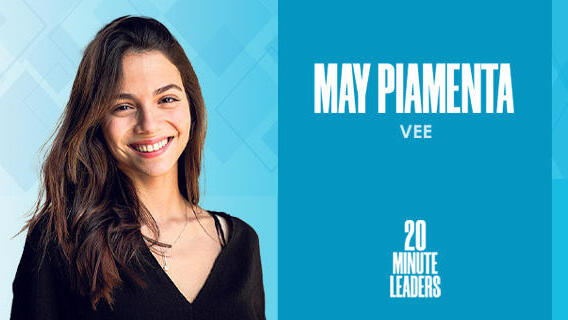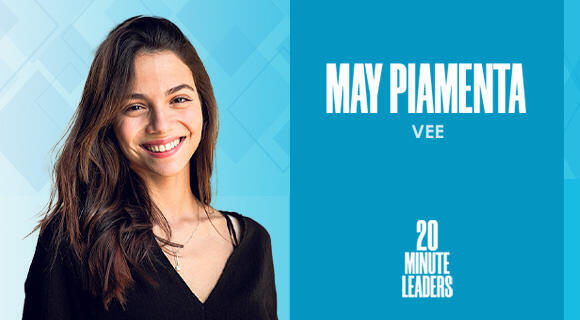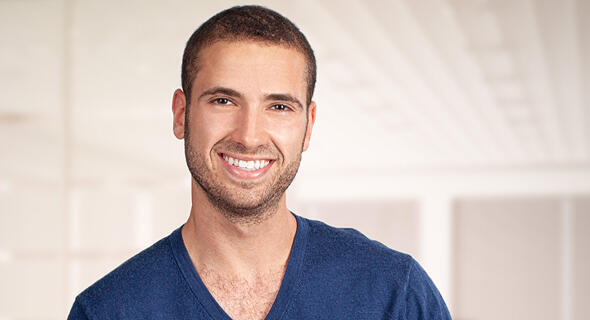
20-Minute Leaders
“We're a startup that is not playing with minds; we are playing with hearts.”
Knowing why someone is doing something is important to May Piamenta, co-founder and CEO of Vee.
Knowing why someone is doing something is important to May Piamenta, co-founder and CEO of Vee. Understanding a person’s purpose can change the picture you have of them. She shares that everyone has their own why and their own causes they want to support, and Vee aims to help connect people to opportunities to help. As a network of good, it allows people to share and sign up for volunteer opportunities. Piamenta explains they plan to expand into collecting donations and offering ways for people to directly help those in need rather than going through an organization. As a platform for social missions, Vee is targeting hearts rather than minds, she says. In the process, they are learning insights about volunteer behavior. For example, people are more likely to volunteer with a friend who invites them even if they are not passionate about the cause.
Click Here For More 20MinuteLeaders
Thank you for allowing me to take part in Vee as a small investor. Tell me about who you are and how you ended up starting Vee.
I'm 22. I'm originally from Dimona. I have two siblings and I grew up to a family of great parents, not connected to tech in any way. When I was eight, I lost my best friend to cancer. Her name was Efrat. After she passed away, I wanted to give back to her. When I was 13, I saw an article from Zichron Menachem, the Israeli nonprofit that supports kids that suffer from cancer. It requested girls to cut their hair and help them with wigs preparation and to donate the roots for cancer hair loss research.
I saw this article, and I knew that it had to be me. I want to cut my entire hair. So I came to my mom saying, "Mom, I'm cutting my hair. I'm shaving everything." She told me, "You are never going to do that." The day after, I had no hair.
I can only imagine going to school the next day as a 13-year-old with no hair.
It was terrible. I looked like a boy. It was super weird, especially at that age. I was so ashamed of walking around with no hair that I bought a wig. My grandfather took the wig and put it in the trash. He said, “You just cannot give this hair so much space in your confidence." Having no hair and seventh grade was a big challenge. I shifted and I moved to the other school in Dimona.
Lucky me, I landed on the day they were recruiting for the robotics team in the school. I signed up for two majors: one was fashion, one was robotics. With my fashion side, I opened a website of swimwear and I ran it for a year. But then I got accepted to the robotics team, and I participated in FIRST Robotics competitions for five years. That was the best experience of my life. They gave me my confidence back. They gave me my English. They gave me my entrepreneurial skills. They exposed me to so many things.
Tell me about the confidence that it instilled in you and how this shaped your outlook now.
When I shaved my hair, I did something for a good cause. When you get such a terrible response from people, it doesn't make sense. I was like, "I don't want to be here. I want to be around people that will understand the purpose of what I did." When I'm taking this experience today, I know that as a founder, a CEO, a friend, a girlfriend, a colleague, I always want to see the reason why a person does something, whether it's good or bad. Understanding the reason and the purpose and where a person comes from can change the picture completely. This is what I embraced from this experience as a person.
Tell me about the formation of Vee.
Vee is the "network of good," as we call it. We are building the network of good that will collect and connect people from all around the world around social missions whether they are the mission creators or the people that are helping the missions. Now, it's only through volunteering, but soon to be in more channels of help, like donations. Eventually, we aim that our technology and platform will eventually connect the people that need help directly with the people that help them. We monetize this beautiful thing by helping the larger organizations, like companies, ministries, municipalities, schools, universities, et cetera, to do good at scale.
Let's say that a company like Sisense wants to volunteer with 600 employees through the whole year, so they use Vee in order to connect their employees to missions around them, to get them together, and to report their hours and get tax refunds, et cetera. So everything goes out to the B2B side. But we are looking at Vee and how we can do this at scale. We are attacking this bottom-up, super scale, taking city by city all over the world. It's tough, but it's definitely possible.
The solution came from my experience managing volunteers at FIRST competitions. They picked one student from each country to join the CSR team, and I was the one from Israel. This is where I was exposed to the challenges and the potential of the Corporate Social Responsibility world. It was so early, 2016. Now every company knows that it's a must-have thing. The transformation was crazy. We are going to be the technology that puts everything together.
What is the consumer behavior piece of it? Do you need to do a lot of market education? How are people receptive to this new way that they are going to be spending some of their time within their organization?
We ask all the time how to become the consumer brand, even more than the employer brand. If they want to do it, the problem is solved for the company. First of all, we invest heavily on brand and local brand. For example, now we are on a mission to make Vee the number one platform in New York. So we are starting to do many local brand initiatives. Subway. Billboards. We need the actual users and people to know us, to trust us that we will know where to send them.
Although Vee is an employee benefit product today, most of our users don't use Vee during work. They take their kids. They go with people outside of work. This actually brings us to understand that we are solving a bigger problem for the people: that they do not necessarily want to go to volunteer only with their colleagues. They do want to go with their kids or wife or friends. This is where Vee comes in because our opportunities are so diverse. We now have over 1000 missions live on the platform. We had a hundred at the beginning of this year. Having so many opportunities enables and gives us the opportunity to explore more new use cases. For example, we have a building owner that is giving Vee to the residents. We would never think about that when starting.
When a building owner gives Vee to their tenants, they then can go and choose one of the thousand missions that speaks to their own why. Right? If we can just align that why with a need that somebody else has, then we can find a huge win-win. Vee is using the inspiration of SaaS companies to monetize this and do it at scale, right?
Without connecting the why to a need, it is very hard to scale it from there. Building the network for us is just finding those whys, finding those needs, matching them locally. I want to volunteer for something that is a 10 minute walk from my house, that I know the community. We're like a startup that is not playing with minds; we are playing with hearts. We know what things will shift the needle in the hearts of people in New York. Eventually, we'll be able to know which people will donate to these causes. We are going to have data for fundraising platforms.
But another thing is that it's not just the cause. People would rather volunteer with people that invite them, even if it's not their number one cause. I want to do it with you rather than go alone to something that I care about. In the product, we always try to get people inviting each other because then the conversion is over 90% of yes.
Michael Matias, Forbes 30 Under 30, is the author of Age is Only an Int: Lessons I Learned as a Young Entrepreneur. He studies Artificial Intelligence at Stanford University, is a Venture Partner at J-Ventures and was an engineer at Hippo Insurance. Matias previously served as an officer in the 8200 unit. 20MinuteLeaders is a tech entrepreneurship interview series featuring one-on-one interviews with fascinating founders, innovators and thought leaders sharing their journeys and experiences.
Contributing editors: Michael Matias, Megan Ryan

